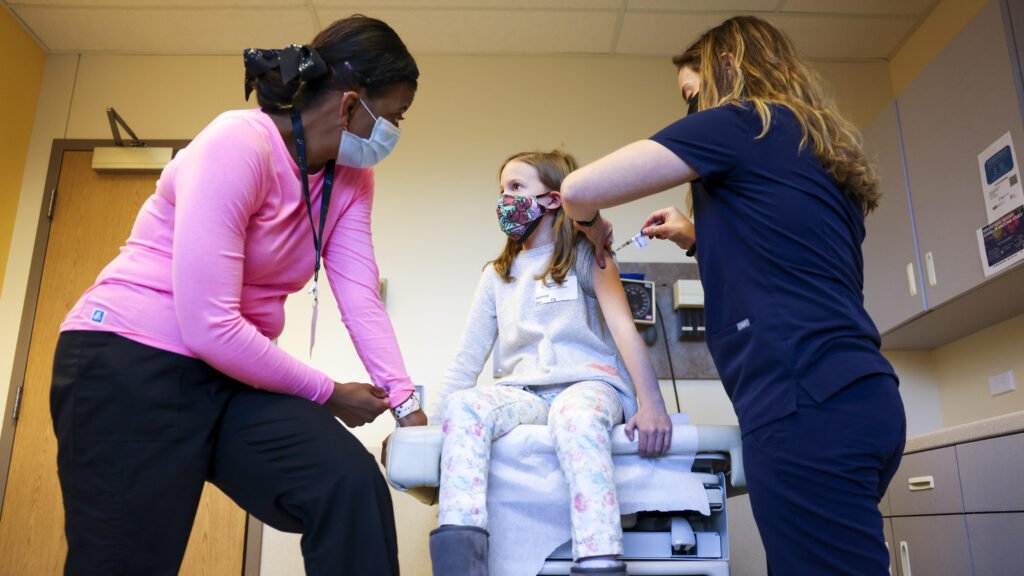The new framework for Covid-19 vaccines announced by Food and Drug Administration leaders has sparked discussion and confusion among physicians and public health experts. The plan, outlined in a commentary in the New England Journal of Medicine, suggests that the FDA will no longer approve new Covid vaccines for healthy individuals under 65, including babies, without data from new randomized clinical trials showing their benefit.
The announcement has raised questions about the implications for childhood vaccinations. While existing Covid vaccines for children are not affected by the new framework, it remains unclear how long they will remain in force since Covid is no longer considered an emergency. Pediatricians have expressed concerns about the possibility of Covid shots becoming unavailable for children, especially considering that some children without underlying health conditions have been hospitalized with severe cases of Covid.
The commentary titled “An Evidence-Based Approach to Covid-19 Vaccination” has drawn criticism from some experts who feel that the decision-making process should involve a broader group of experts and stakeholders. The commentary’s emphasis on evidence-based decision-making has raised questions about the role of clinical trials in determining vaccine eligibility, particularly for children.
FDA Commissioner Marty Makary and the agency’s vaccine regulator, Vinay Prasad, have defended the new framework, stating that it is based on an assessment of available evidence and the need to prioritize high-risk populations. Prasad, in particular, has expressed skepticism about the necessity of Covid vaccines for children, citing data that suggest children under 4 are at lower risk of severe disease compared to older age groups.
Despite the controversy surrounding the new framework, some experts support the idea of targeting vaccines based on risk. They argue that prioritizing high-risk individuals, such as the elderly and immunocompromised, is a sensible approach that aligns with strategies implemented in other countries.
As the FDA works to provide clarification on the new framework and its implications for vaccine eligibility, the American Academy of Pediatrics and other medical organizations are collaborating with the agency to gather more information. In the meantime, there is uncertainty about how the new guidelines will impact vaccine recommendations for children and other populations. It is expected that further guidance will be issued as more data becomes available, but for now, the future of Covid vaccinations for different age groups remains uncertain. As the number of adults with some level of immunity to Covid-19 continues to rise due to vaccines, infections, or both, many vaccine experts are advocating for a more targeted approach to recommending Covid vaccines. This shift in strategy has sparked a debate among experts about the potential implications and consequences of such a change.
Some experts have raised concerns about the impact of new restrictions on individuals who live with or interact with high-risk individuals, such as those undergoing chemotherapy or organ transplants. The argument is that getting vaccinated could potentially save the lives of vulnerable individuals, and therefore, vaccination should not be limited to high-risk individuals only.
On the other hand, some experts have pointed out that the approach to recommending Covid vaccines should be aligned with the strategy for other vaccines, such as the RSV vaccine, which is primarily offered to high-risk individuals. They argue that restricting access to Covid vaccines could help reduce the risk of transmission and infection, particularly among vulnerable populations.
The discussion also extends to healthcare workers, with some experts highlighting the importance of vaccination for reducing the risk of transmission to patients. However, the low uptake of Covid vaccines among healthcare workers has raised questions about the effectiveness of recommending vaccines to this group.
Another important consideration is the potential impact of the new vaccine framework on marginalized communities, particularly Black, Hispanic, and Native American populations, who have experienced higher hospitalization and death rates from Covid-19. Restricting access to vaccines could further widen existing healthcare disparities and make it challenging for vulnerable individuals to protect themselves.
Furthermore, the issue of long Covid has been overlooked in the conversation about vaccine eligibility. People with long-lasting post-Covid symptoms have expressed concerns about the lack of emphasis on the role of vaccines in reducing the risk of long-term complications.
While some experts argue that restricting access to Covid vaccines could help rebuild trust in critical vaccines like the measles vaccine, others question the logic behind this approach. They argue that pushing a vaccine policy that limits access based on mistrust could further fuel vaccine hesitancy and undermine public health efforts.
In conclusion, the debate surrounding the recommendation of Covid vaccines to everyone versus a more targeted approach highlights the complex considerations and potential consequences of such a decision. It is essential for policymakers and healthcare professionals to carefully weigh the benefits and risks of different vaccination strategies to ensure the most effective and equitable approach to protecting public health.


